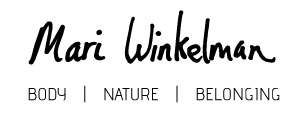Self care and companionship are interlinked and have become a practice and value system which have revolutionised my health, my life and relationships and my work as a therapist. For every client I work alongside, as part of my intention for their wellbeing, I aim to support them to recognise what they already do, which is an act of self-companionship and care. This can lead onto what they want to develop more in the therapeutic work we do. For every movement group I offer, self-care and companionship are foundation principles for the design of the practices I will guide people through.
Think of a place you live in or have lived in for some time. You get to know it as you see it, the journeys you make there, leaving and returning, you have a feeling for it and it becomes a part of you. You care about it and what happens there; you recognise the landmarks, you see the changes in the seasons and over time. Sometimes you don’t see things because they are too familiar, but when change occurs you know it has changed. Like knowing a place, I feel that self-care and companionship is about knowing my body; not just about occasionally being nice to myself – apologetically ‘unwinding’ after stressful times by having a long bath – but actually building loving behaviour toward my body into my lifestyle.
Self-companionship is about building a knowing relationship: learning the feeling and qualities of condition, e.g. aches, tensions, energy levels, as well as what feels good, pleasurable, relaxing. One habit which industrialised societies breed, is to take a paracetamol for pain and get on with your work; then have a drink (cafeine/alcohol) to lift or energise you. I used to do this regularly until my body started reacting with bigger symptoms of stress and I realised that taking a paracetamol and carrying on was like telling my body to shut up. Well, like a lot of bodies, if I don’t ‘listen’ to mine, it doesn’t shut up, it just gets louder!
Knowing my body signals better involves daily attention and can be preventive of stress building over time. I learn how to respond to these signals and feelings and I build a context of feeling in my body so that when some unusua l feeling arrives, I recognise it more clearly and pay attention – what is it telling me and do I need to find out more or do I recognise what it’s telling me? My ‘feeling’ symptoms can tell me things about my emotions, my physicality and thoughts, for instance tensions, aches, energy levels. If something feels very intense or unusual, I will seek advice from a professional, as their context for recognising symptoms is much wider than mine. Over time, my self-companionship is saving me many trips to the GP because I’ve learnt to interpret both physical and mood changes and respond to what is called for: more rest, better food, more fluid, more activity, more intimacy in my relationships, more time in nature, more work, less work… A good GP will also encourage this self awareness and care and feed into your knowledge base.
l feeling arrives, I recognise it more clearly and pay attention – what is it telling me and do I need to find out more or do I recognise what it’s telling me? My ‘feeling’ symptoms can tell me things about my emotions, my physicality and thoughts, for instance tensions, aches, energy levels. If something feels very intense or unusual, I will seek advice from a professional, as their context for recognising symptoms is much wider than mine. Over time, my self-companionship is saving me many trips to the GP because I’ve learnt to interpret both physical and mood changes and respond to what is called for: more rest, better food, more fluid, more activity, more intimacy in my relationships, more time in nature, more work, less work… A good GP will also encourage this self awareness and care and feed into your knowledge base.
Self-companionship goes beyond ‘care’ as most ‘wellbeing’ and ‘beauty’ industries would interpret it – pampering, beauty re-vamps, ‘recharge your batteries’ retreats – because, as becomes clear, self-companionship puts us in touch with our uniqueness, our inner truth and our potential to live more simply as confident, healthy and caring people. In fact self-companionship has been and continues to be essential for me to know my inner authority, feel my confidence and connection to my truest values and beliefs. Importantly also, I can recognise what I am being ‘called towards’: what excites and enlivens me in my heart and soul. This kind of knowledge is very unique and we cannot be told by others what this is, we need to take care to recognise it.
 As with the place we live(d) in and love, in being a companion to ourselves, we also want the best for ourselves, because when we give ourselves care, we thrive and this can overflow into all that we do and are for others and in this world. Self- companionship, from my experience, is slow, committed, unpredictable, sometimes painful and deeply satisfying over time.
As with the place we live(d) in and love, in being a companion to ourselves, we also want the best for ourselves, because when we give ourselves care, we thrive and this can overflow into all that we do and are for others and in this world. Self- companionship, from my experience, is slow, committed, unpredictable, sometimes painful and deeply satisfying over time.
Get in touch with me if you want support to start or develop your own self-care and companionship.


